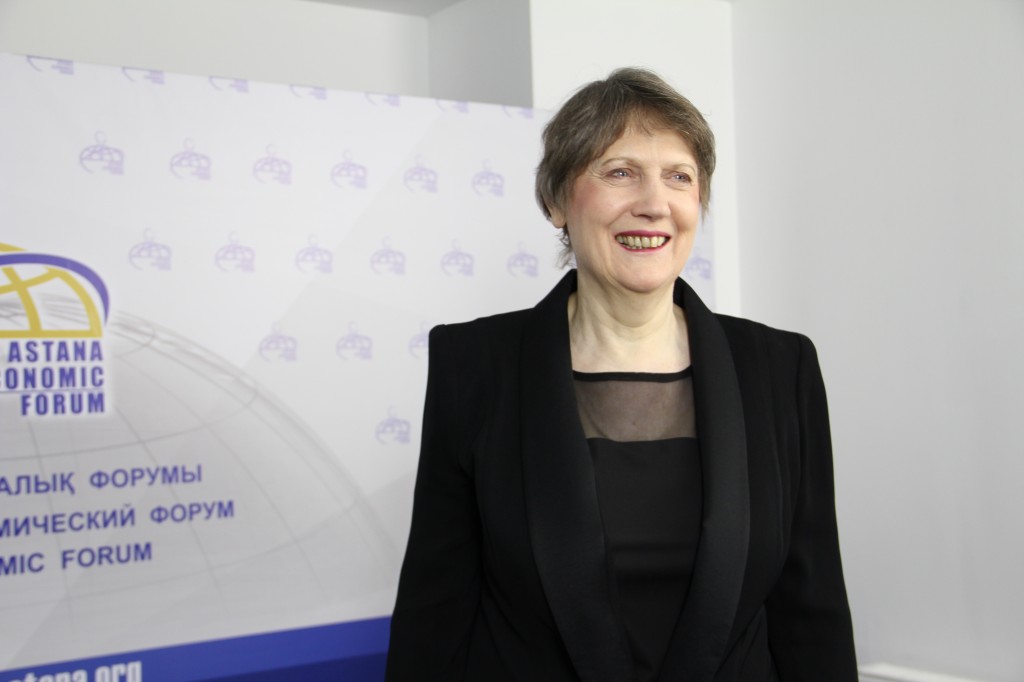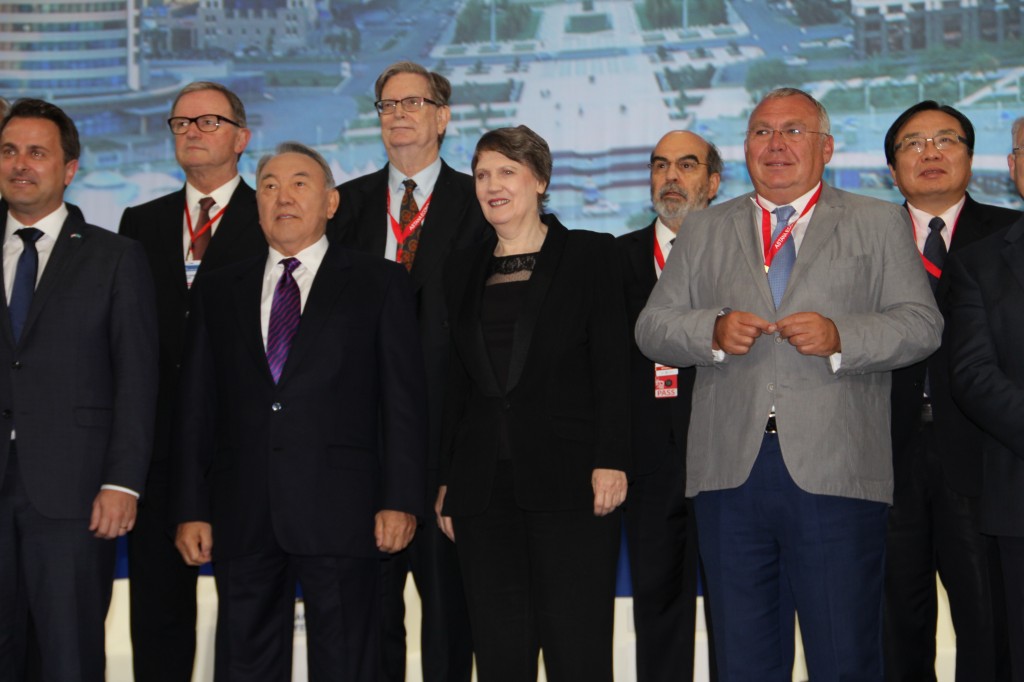ASTANA – The UN Development Programme is pursuing a stronger partnership with Kazakhstan, believing that the country can be a strong player in south-south cooperation and an important proponent of the organisation’s Sustainable Development Goals (SDGs), UNDP Administrator Helen Clark told The Astana Times on May 24.
 “What I’ve raised here is our interest in striking a strategic partnership agreement with Kazakhstan, formally, which would put a kind of formal umbrella over the work we’ve been doing to support the legislation on KazAID [the working name of Kazakhstan’s new official development aid agency] and now the strategic thinking about how KazAID might develop,” said Clark, who had come to Kazakhstan to attend the Astana Economic Forum on May 21-22 as well as to visit some of the UNDPs ongoing projects across the country.
“What I’ve raised here is our interest in striking a strategic partnership agreement with Kazakhstan, formally, which would put a kind of formal umbrella over the work we’ve been doing to support the legislation on KazAID [the working name of Kazakhstan’s new official development aid agency] and now the strategic thinking about how KazAID might develop,” said Clark, who had come to Kazakhstan to attend the Astana Economic Forum on May 21-22 as well as to visit some of the UNDPs ongoing projects across the country.
The UNDP has operated projects in Kazakhstan for years now, but with the country reaching upper middle-income status, the nature of the partnership is ready for a change. “Traditionally, the UNDP had developed country partners which funded it, and it had developing country partners that it was funded to work in,” Clark explained. “Now, the world is no longer that simple. Once a country gets up to middle-income status, high middle-income status in the case of Kazakhstan, it doesn’t need your money. It needs your ideas and innovation. And so the relationship moves quite a lot. And such countries also start to look at how they’re positioning globally and their own development cooperation.”
The UNDP has developed formal agreements with eight of the G20 emerging economies, Clark noted. China, Brazil, Indonesia, Turkey, South Africa and Mexico, among others, are all doing development cooperation, she said, and in these cases, the UNDP changes its approach. The primary concern is to remain relevant to the country’s development and continue to operate projects as needed within the country, but also to help support more south-south cooperation and triangular programmes involving third countries through the developing nations’ own aid agencies. “So it’s about a partnership that sees us working not only in the country but with the country in its global and bilateral relationships for development.” The UNDP has concluded these types of relationships with other upper middle-income counties, like Chile, and Kazakhstan seems quite interested, Clark reported.
Kazakhstan could be a significant ally in working toward the SDGs, Clark said, which are expected to be signed off upon in September. “Of course, there are development needs here, but Kazakhstan also has a lot of experience to share, and KazAID could be the vehicle for that.”
 KazAID will need partners, she noted, as it lacks an on-the-ground presence in many countries, particularly throughout Africa, where Kazakhstan is showing a great deal of interest, opening new embassies and joining the African Union as an observer state. “That is where a big multilateral like the UNDP comes in,” she said.
KazAID will need partners, she noted, as it lacks an on-the-ground presence in many countries, particularly throughout Africa, where Kazakhstan is showing a great deal of interest, opening new embassies and joining the African Union as an observer state. “That is where a big multilateral like the UNDP comes in,” she said.
“We could be a good partner and, having got the legislation in place and started construction of the agency, the officials now will be thinking, ‘Well, what are we going to do?’ We can be helpful, as we have been with other such countries and emerging economies’ development agencies where we can support the development strategy.” Kazakhstan’s Ministry of Foreign Affairs and the UNDP are already working together to bring nearly 100 African students to Kazakhstan for training in the oil industry, public health and agriculture, an initiative announced at the African economy panel at the Astana Economic Forum. Kazakhstan’s experiences in the oil industry, crop diversification, dry land agriculture and solutions for its landlocked status are experiences other developing countries will definitely want to know about, Clark said.
When it comes to south-south cooperation, knowledge sharing is crucial, she explained. “It is not the traditional official development assistance, a lot of which is grant aid. … There’s not so much outright money that goes into south-south cooperation. It would be maybe a sixth of what Western donors put out. But the critical thing is the experience sharing and the knowledge sharing,” she said. Developing countries are interested in how other nations in their position tackled their problems. “For example, if you’re a lower middle-income landlocked country in Africa, where do you look for advice? New Zealand’s probably not going to be so relevant, or Canada. But Kazakhstan could be, or Uzbekistan could be. … That’s really at the heart of south-south cooperation.”
This type of cooperation will also support the SDGs, she said. “Actually, to achieve the SDGs, there has to be a lot of policy reform. So if, for example, a country is subsidising fossil fuels – these need to go. They have to go!” This, she argues, will free up money that had been going to those who don’t really need it to be directed toward investments that will benefit those who do.
“[The SDGs] are definitely about policy reforms which improve the enabling environment for growth and trade and investment, and … this is what’s very important about Kazakhstan’s institutional reform agenda, the five institutional reforms. What’s at the heart of them? Clean governance and transparency, rule of law. I mean, the concept that this [Astana international] financial services centre will actually run according to English law – this is revolutionary. So these are the kinds of things in the whole policy and enabling environment that need to be done to support growth and domestic resource mobilisation.”
Kazakhstan is also highly bankable, Clark commented, with loans coming in thick and fast from a number of intergovernmental banks, and in that way can also be an example for other countries seeking investment for development projects.
Over her four days in Kazakhstan, Clark also visited UNDP projects using Global Environmental Facility (GEF) funding in operation around the Aral Sea.“The relationship is good … and I think we’re doing things that are of real value, and clearly the government and the regions that are the subject of joint UN programming are happy,” she said. “I think the work done with GEF is extremely important – the Aral Sea, wetlands, water management, more suitable agricultural production. … So I come away thinking our team here has done a good job.”

